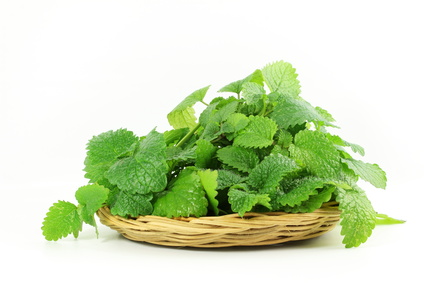
by Brooke Cade
More than just a pretty plant, lemon balm offers plenty of scientifically-proven natural health benefits. Let’s take an in-depth look at this healing herb, including its biological properties, the scientific studies that back up its health claims, and the proper dosage of lemon balm in order to maximize its therapeutic potential.
Biological Properties
Melissa officinalis, has many common names, including:
- Lemon Balm
- Melissa Essential Oil
- Balm Mint
- Bee Balm
- Garden Balm
- Sweet Balm
- Sweet Mary
The plant is native to southern Europe but is now grown around the world. A perennial herb that is a part of the mint and sage family, it grows up to two feet tall. The lemon balm leaves are deeply wrinkled and vary from yellow-green to dark green depending on the soil and climate it is planted in. Throughout spring and summer, clusters of small, yellow flowers bloom.
Rosmarinic, caffeic, chlorogenic, and metrillic acids are all major chemical components of lemon balm. The essential oils contained in the plant include citral (74%), geranial, and neral. The herb also includes large amounts of polyphenol compounds and eugenyl glucoside is contained in the leaves. Terpenes play at least some role in Lemon balm’s relaxing and antiviral effects. It also contains eugenol, which calms muscle spasms and numbs tissues.
Each of these powerful properties plays a role in the pharmacological use of lemon balm.
Scientific Studies
The Natural Standard Review published an evidence-based systematic review in the Journal of Herbal Pharmacotherapy demonstrating strong scientific statistical evidence of lemon balm being a positive treatment for the herpes simplex virus, the influenza virus, HIV, and other similar viral infections. This is due to the antiviral properties of lemon balm’s essential oils, tannins, and polyphenol constituents.
The US National Institute of Health published a behavioral effects analysis conducted by The Indian Pharmacological Society concluding that Lemon balm “may provide a unique pharmacological alternative for certain psychiatric disorders.”
The Department of Biology at the University of Minho in Portugal published an abstract explaining that the growth of all yeast species was completely inhibited by the citral oil contained in lemon balm.
These studies (and others published by Sigma-Aldrich) prove the effectiveness of using M. officinalis (lemon balm) for genital herpes, cold sores, influenza, certain psychiatric disorders such as dementia and anxiety, and indigestion or upset stomach caused by food spoilage yeasts.
Although more studies are required, some evidence suggests that lemon balm, in combination with other herbs, show “adequate activity against Listeria monocytogenes and Staphylococcus auerus”, “increased mood and significantly increased calmness and alertness”, and also helped to “improve cognitive function and decrease agitation in people with Alzheimer disease.”
How to Use It
Lemon balm is available as a dried leaf (which can often be bought in bulk). It can also be bought as a tea, in capsules, as an extract, tincture (made by dissolving in alcohol), and as an essential oil to be used in aromatherapy. In Europe, lemon balm cream is sold.
There are no significant side effects linked to the topical application or oral ingestion of lemon balm. However, it may interact with thyroid medications as it was used in the past to treat Grave’s disease, an autoimmune condition in which the thyroid gland produces excess thyroid hormone. Also, since it boasts mild sedative properties, too much sleepiness may be experienced if you take it along with other sedatives.
It’s always wise to consult with your doctor about your adverse symptoms and dosage requirements before treating yourself with lemon balm, but here are dosage suggestions:
- For herpes or cold sores: Steep 2-4 teaspoons of crushed lemon balm leaf in 1 cup of boiling water for 10-15 minutes. Apply the tea with cotton balls to the sores regularly throughout the day. Alternatively, apply a high-quality lemon balm topical cream to the affected area 3 times daily.
- For indigestion or upset stomach: Take 300-500 mg dried lemon balm capsules 3 times daily. Alternatively, drink lemon balm tea up to 4 times daily.
- For improving sleep: Mix 80 mg of lemon balm leaf extract with 160 mg of valerian root extract and put in empty capsules. Take 3 times daily for up to 30 days.
Essential Oils Are Not A Substitute For Medicine
Although the uses and benefits of using essential oils are numerous, essential oils should not take the place of prescribed medicine. They are best when used in conjunctions with a healthy diet and lifestyle (8 hours of sleep every night, regular exercise, no smoking, etc.), along with the expert advice and guidance of a trusted doctor. But you’ll find that, when used properly, essential oils can have an amazing impact on your overall wellbeing.
(Brooke Cade is passionate about health and wellness. She enjoys writing about all the things she loves in life, including yoga, organic foods, and anything related to living life to its fullest.)






I didn’t know lemon balm can help with anxiety and cold sores, as well as other serious ailments such as herpes and influenza. I agree that it shouldn’t be substituted for medicine but this is really helpful nonetheless. Thank you for sharing this. It’s very insightful and helpful.